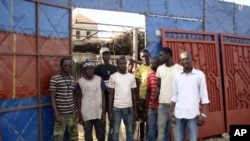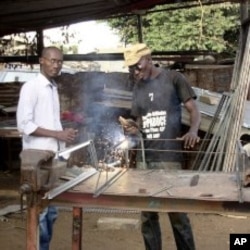Senegal has one of the highest remittance rates in Africa, partly a result of strong economic and social pressures that push many to go abroad in the first place - often illegally and often at great personal expense. Amanda Fortier reports from Dakar on one illegal immigrant’s experience returning to Senegal, and how a local organization is trying to ease the transition by providing financial and psychological support.
Gueye
Elhadji Moctar Gueye left Senegal in 2007 on a one-month tourist visa for Italy. He had just finished his masters' studies in business finance in Dakar, but had yet to complete his thesis. Gueye was 32, recently married, and the oldest child in a poor family of 11 children. It was past time to get a job.
Gueye says his initial plans were to go to Europe to finish his studies and return to Senegal to work. But if this did not happen, he planned to find work in Europe. Gueye says he did exactly as all other immigrants do when they leave - intending to go for a short period, but then deciding to stay on.
Gueye remained in Italy for two years without legal papers. He eventually found a job as a metalworker, earning about $1,400 a month. Every month for five months he sent back $250 to $400 to his family, who might otherwise go a month without earning a cent.
Supporting family
Gueye says he was proud to send this money back, but it was not the job he studied for. If he continued to stay in Italy, he knew he would lose his intellectual abilities. Gueye says this work would have never allowed him the opportunity to do the research and studies that he was interested in.
The World Bank says African migrants remit twice as much as the average migrant from other developing countries. During the past 20 years remittance flows into Africa have quadrupled, reaching $40 billion in 2010.
Senegal receives remittances of more than $3,000 per person per year. This is more than four times the average in other West African countries, such as Ghana or Burkina Faso. In Senegal, the largest contributors to these remittance payments are men like Gueye - young educated males who migrate to Western countries and do whatever they can to help cover their family’s living costs back home.
Counseling services
Aloise Sarr is in charge of programs at Le Pari, a refugee and immigrant aid organization in Dakar that works with European non-government organizations helping to repatriate immigrants by providing financial aid and psycho-social counseling.
Sarr says it is hard for him to talk of the advantages of migration when the majority is illegal, and the migrants are forced to work "under the table" to survive. For many of them, friends and family paid for their trips to Europe and to the United States. They do this in hopes to get something back. It is a type of what he calls a ‘salvation voyage’ for the migrant, which can bring a lot of shame on the person if they come back with their hands empty.
Sarr says this is such an important aspect that some migrants actually prefer to stay in their host country, even if they are miserable and without papers, just to avoid the embarrassment.
Returning home
Gueye first returned to Senegal in 2009. Initially, his family was not supportive and advised him to be patient and keep looking for work.
Gueye says in Senegal all families like to see their children travel, so of course they were happy when he left for Italy. But after a certain point in time, Gueye says he was no longer concerned about what everyone else wanted. He did not ask for their opinion anymore, because he was the one fighting for a better life for them.
Gueye tried to start up a couple butcheries in Senegal, a project that soon failed due to lack of funds.
Determined to find a job, Gueye flew back to Europe on a short-term visa to Belgium. He stayed a year using a Senegalese friend’s ID card to get a job putting up posters for about $1,300 a month.
Starting a business
Eventually he connected with the aid agency, Caritas Belgium, which collaborates with Le Pari in Dakar. He submitted a project proposal and business plan to start a metal works company in Dakar. It was a way to combine his academic background in finance with his practical experience working in Europe.
When Gueye returned to Senegal, for this second and last time, it was to begin his business with a small startup fund of $2,800.
Gueye says this time it was harder to come back, because a lot of people saw him as a failure. When so many people are trying to get to Europe and they see someone who voluntarily comes back, they think this person is not ambitious and worth nothing. But Gueye says he knows what it is like in Europe and a lot of people there have trouble making ends meet while trying to do exactly what he is - starting his own business and following his passion.
Sarr says the number of migrants wanting to return to Senegal is increasing, and through their program they are finding the emotional and psychological support will become more important in the coming years.

